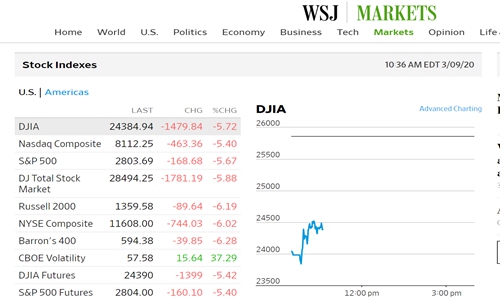
Photo: Screengrab of Wall Street Journal website
The novel coronavirus epidemic has had a global impact. If the epidemic causes more severe damage and harshly disturbs the global economic performance in the first half of 2020, its consequences will be extensive and profound. The Chinese people must be fully prepared.
COVID-19 will hit global stock markets and supply chains. Such impacts are surfacing. Worse, the ongoing epidemic will fuel populist and nationalist anti-globalization sentiment. All kinds of extreme proposals will be made.
The US and some European countries might get lost politically. Pan-xenophobia may run wild and lead to radical political forces gaining more power, which would turn back the clock on globalization, confuse frustrated voters with extreme, romantic slogans.
The fear of the coronavirus will resonate with the previous anti-globalism and lead to ideological self-deception. For example, some people will start to miss the era before globalization and few immigrants and no epidemics. At that time, Western people also lived a rich life. But in fact, during the Cold War, the West was richer compared to the East. Many Western people's consumption ability at that time cannot be compared with that of today.
Ordinary Europeans and Americans can buy dozens of cheap T-shirts made by workers from developing countries. They may just throw them away if the T-shirts get dirty. This was unimaginable decades ago.
But the COVID-19 may disrupt the collective thinking of some Western countries, in which rationality is replaced by fear and anger and some short-sighted ideas may be regarded as truth.
In addition, it cannot be ignored that the risks might turn into a geopolitical challenge. It is necessary for China to step up research on the novel coronavirus and make plans in advance.
To begin with, China must fully resume its economic operations and maintain its close connection with other countries in terms of interests. It should demonstrate its reliability as a major economic power and maintain its attractiveness to the world.
China must explore a model that not only guarantees control and prevention, but also benefits the full-speed operation of the economy. This will be one of the important sources of national competitiveness in the future. All countries are confused about how to create such a model. China has taken the lead in achieving effective epidemic prevention, but the other half is still far from complete. It should be our priority in the future.
China should improve economic weak links as soon as possible, which is the key for China to increase its national competitiveness. China and the US were highly complementary economically, but the US started to decouple before the outbreak. The US wants to reconstruct its manufacturing capability or diversify supply channels outside China, and China needs to speed up to make breakthroughs in some key technologies. The country that moves faster will gain the initiative.
China's manufacturing industry covers extensive fields. The country should bring this advantage into full play. This will not only benefit China's national security, but will also enable the country to provide more services to the world.
Globalization cannot be strategically reversed, yet the novel coronavirus can cause temporary but serious harm to it. As one of the biggest engines of globalization, China must keep the engine functioning well and not to slow down amid the epidemic's impact.



